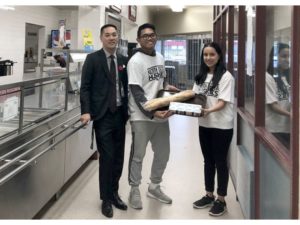Principal Aaron Akune can’t do anything to alleviate the poverty found beyond the boundaries of North Delta Secondary, but he can certainly try when he finds it on school property.
His school of 1,100 students on 82nd Ave. and 114th St. is in the middle of an area where the contrast between financially comfortable and poor is often stark.
“There are some very lavish houses around here, but then a few blocks later we have people living in social housing and basement suites.”
He met families occupying both ends of this financial spectrum during a walkabout he took with students as an outreach to residents.
There were signs of poverty in some dwellings and Akune, who became principal in January, sees tell-tales of the condition in his school, too.
“We see the markers. We see kids coming in early. We see them wearing the same clothes week after week, having poor footwear. And we see them hungry.
“The kids are hungry because sometimes families are scrambling and can’t get it together, but mostly it’s because they don’t have food.
“These kids haven’t had breakfast, they bring no lunch with them, and they don’t have money to buy lunch. So, basically, they would have nothing to eat all day.”
Akune and his staff have been doing what they can to feed them using a small contingency fund of $2,300 from the school district. With this, they have purchased food from the school’s privately operated cafeteria.
“They give us a break on the cost, but it’s not sustainable doing this,” said Akune, who ran out of money within six weeks of school opening in September.
“It would be more efficient if we ran this ourselves. We can’t continue to operate like this. It is not fiscally responsible, and we think we can reduce the cost by half,” he said.
He has applied to The Vancouver Sun’s Adopt-A-School campaign for $12,000 so he can provide hungry students a proper breakfast and lunch, if necessary.
If they get support, Akune and teachers will make use of a classroom, find their own utensils and equipment, and buy the food each week. Breakfast will be laid out like a buffet and students will be able to drop by and help themselves.
“We can’t give them hot food, but we can give them bagels, fruit, yogurt, milk, cereals — a good breakfast — and if we need to, lunch as well. But right now, we see more pressure for breakfast than lunch.”
“It will be a self-serve. They’ll be able to choose what they want.”
He is also concerned about a number of students who don’t come to school regularly. Having food in the morning might help.
“I’m not sure if it’s lack of food or if there are financial issues, but some of the kids have a challenging home life — running back and forth from one house to another.
“In many cases, parents are working two minimum-wage jobs and working odd hours.
“I have a student who said he hadn’t seen his mother in a week. I asked him why and he said when he comes home from school she has gone out to work until midnight and he never sees her, maybe at the weekends.
“Your heart just goes out to them.”
The weekends are another concern. He is worried some students are going hungry then, too.
“It wouldn’t surprise me.”
By Gerry Bellett (gbellett@gmail.com)

